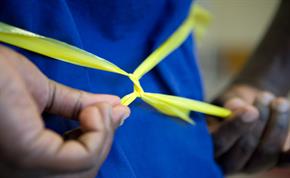
An outbreak of Ebola virus disease (EVD) was first reported in March 2014 in Guinea, and has since involved three countries in west Africa: Guinea, Liberia and Sierra Leone.
EVD is a form of viral haemorrhagic disease. Most infections result from direct contact with the bodily fluids or secretions of infected patients, use of contaminated medical devices (including needles and syringes) and unprotected exposure to contaminated bodily fluids.
Although the likelihood of imported cases is low, frontline staff are reminded to remain vigilant for travellers who have visited areas affected and who develop unexplained illness:
If you suspect a patient has Ebola, staff should wear the following PPE:
Strict cleaning schedules should be adhered to and a full vehicle clean, along with uniform change, should be undertaken if there is contamination.
For more information, please visit the Public Health England website.
Published on 3rd July 2014